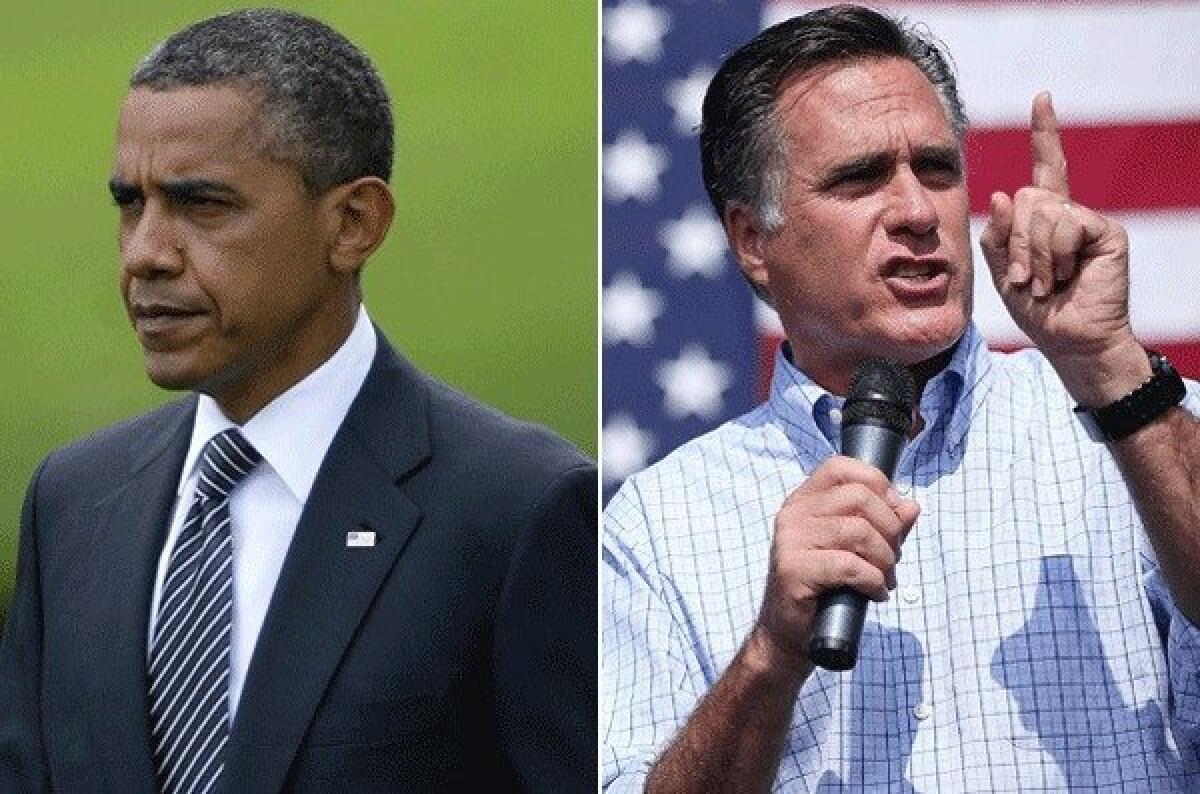McManus: Romney vs. Obama on foreign policy

In a presidential campaign dominated by voters’ unhappiness with the economy, it took a tragedy — the killing of a U.S. ambassador by Libyan extremists — to prompt a real debate on foreign policy.
It may be tempting to decide that last week’s flap over the candidates’ reactions to tumult in the Arab world amounted to little more than campaign talking points and gaffes. Depending on your politics, President Obama showed himself to be a weak and cowering apologist, or Mitt Romney revealed himself to be an inexperienced, reactive hawk.
But history shows that presidential candidates take most of their election-year positions seriously, especially on foreign policy. And the week’s events gave some real insight into the candidates’ quite different approaches to events abroad.
PHOTOS: Protesters attack U.S. embassies, consulate
Obama’s approach to the Middle East and Iran has been a combination of outreach — largely unrewarded — and limited use of U.S. power. He tried to engage Iran’s rulers with promises of a new relationship if they halted their nuclear program; when they refused, he worked with other countries to impose tougher economic sanctions. He cautiously backed the revolutionaries who overthrew Egypt’s Hosni Mubarak, and he joined a European-led war to topple Libya’s Moammar Kadafi, but he has offered only nonmilitary aid to the rebels in Syria.
Those policies flow from Obama’s convictions about foreign policy. He came to office in the wake of mismanaged wars in Iraq and Afghanistan, and was determined not to make the same mistakes. He believes our straitened finances require caution and thrift in U.S. foreign policy. To that end, he advocates modest cuts in defense spending.
Romney’s convictions are quite different, as is his approach to foreign policy.
COMMENTARY AND ANALYSIS: Obama vs. Romney
He wants to increase defense spending significantly — by almost $2 trillion over 10 years, according to one estimate; he insists that Obama’s 21st century thrift is a terrible mistake.
“It is resolve that moves events in our direction,” he said in a foreign policy speech in July.
In other words, Romney wants the United States to speak more loudly and carry a big stick. If that sounds reminiscent of George W. Bush, it is; many of Romney’s foreign policy advisors (some neoconservatives, some not) worked in the last Republican administration.
INTERACTIVE: Battleground states
How would a Romney foreign policy differ from Obama’s in practice?
On some issues, the differences would be at the level of nuance. One of those, ironically, is Egypt, the subject of last week’s polemics. Romney has said he would maintain the roughly $1.5 billion in aid the U.S. sends Cairo each year and would continue engaging with the Muslim Brotherhood government there.
But he has also said he would “make sure they understand what the requirements are to remain an ally of the United States.” He says he would put new conditions on U.S. aid, including (according to a Romney aide) “more and firmer stipulations on building institutions of democracy and the rule of law.” Obama administration officials say they are already pressing Egypt on those issues, but mostly in private.
On other issues, though, the differences are sharper. On Syria, Romney has criticized Obama as too cautious and has said he would do more to help the armed opposition topple the government of Bashar Assad. One of his advisors, Richard S. Williamson, has said a Romney administration would actively help supply the rebels with weapons. The Obama administration has given the rebels communications equipment but not arms, an approach Williamson has derided as “risk-averse.”
The clearest difference between the two candidates may be on the issue that’s most dangerous: Iran.
Obama has demanded that Iran halt its nuclear program, and has warned that if Iran acquires a nuclear weapon, the U.S. might respond with a military attack.
Romney has gone further, suggesting that he might launch a preemptive military strike even before Iran acquires a nuclear weapon — when the Tehran regime reaches “nuclear capability” — an earlier, less clearly defined status.
Romney and his aides have refused to spell out what they mean by “nuclear capability.” And Romney muddied the waters last week when he told ABC News that his “red line” on Iran was the same as Obama’s.
Romney has also hinted that he thinks the time for negotiations with Iran is over. “We’re still talking and Iran’s centrifuges are still spinning,” he complained in his acceptance speech at the Republican National Convention.
Essentially, Romney’s position is that a clearer, earlier threat of U.S. military intervention is more likely to compel Iran to yield than Obama’s more ambiguous warnings. He may be right, but if he turns out to be wrong, his position would drive the United States into war more quickly than Obama’s, with fewer chances to find a third way out.
There will be tumult in the Middle East for years to come, no matter which candidate is elected this fall; Islamist militants don’t tailor their tactics according to which party holds the White House.
In November, voters won’t only be choosing between candidates who want to raise taxes or lower them on upper-income families, maintain domestic spending or cut it, keep a healthcare law or repeal it. They’ll be choosing, as well, between a president who wants to continue a cautious, thrifty policy of alliance-building overseas — and one who rejects that “risk-averse” approach for a costlier, but bolder, U.S. role.
Follow Doyle McManus on Twitter @DoyleMcManus
More to Read
Get the L.A. Times Politics newsletter
Deeply reported insights into legislation, politics and policy from Sacramento, Washington and beyond. In your inbox three times per week.
You may occasionally receive promotional content from the Los Angeles Times.











